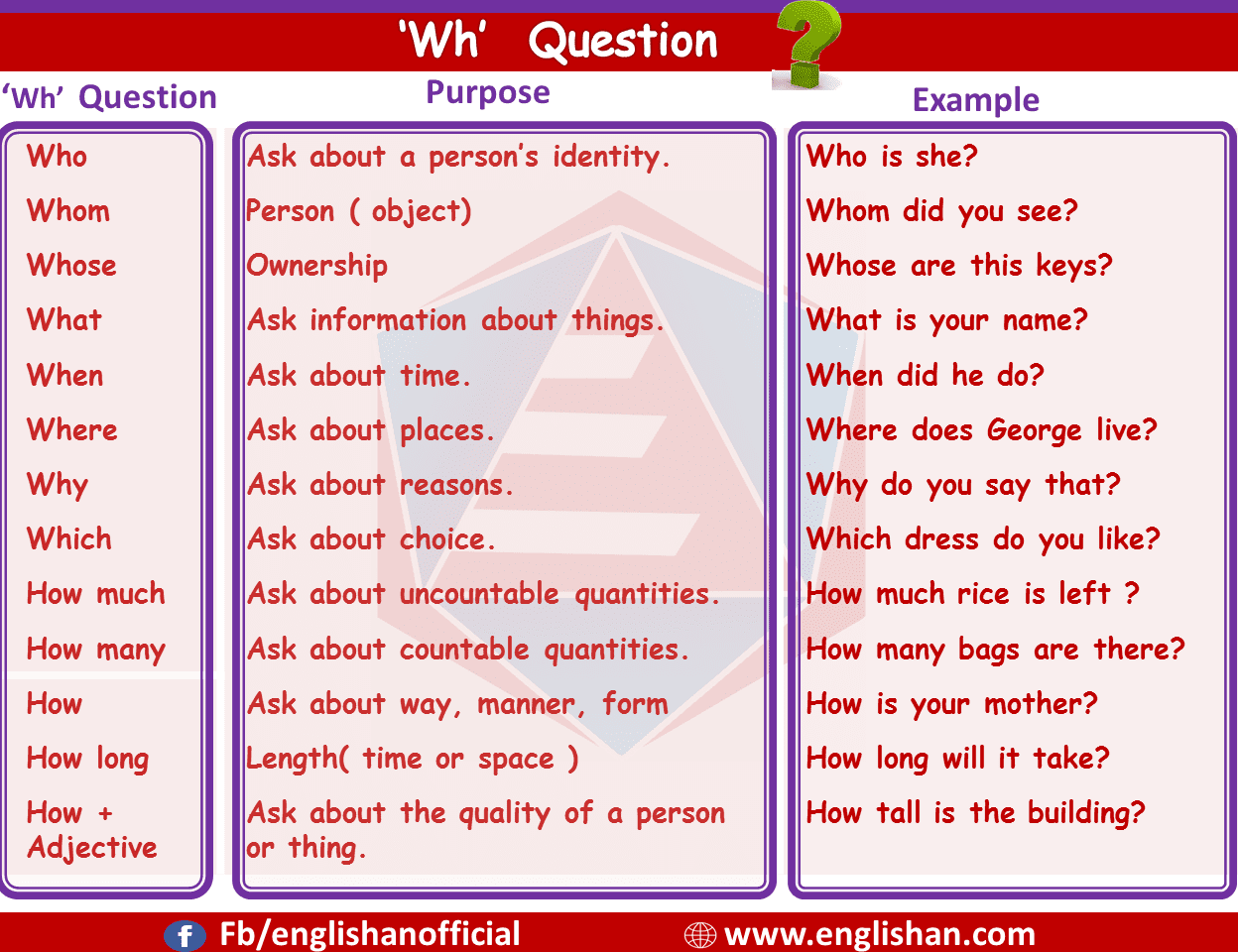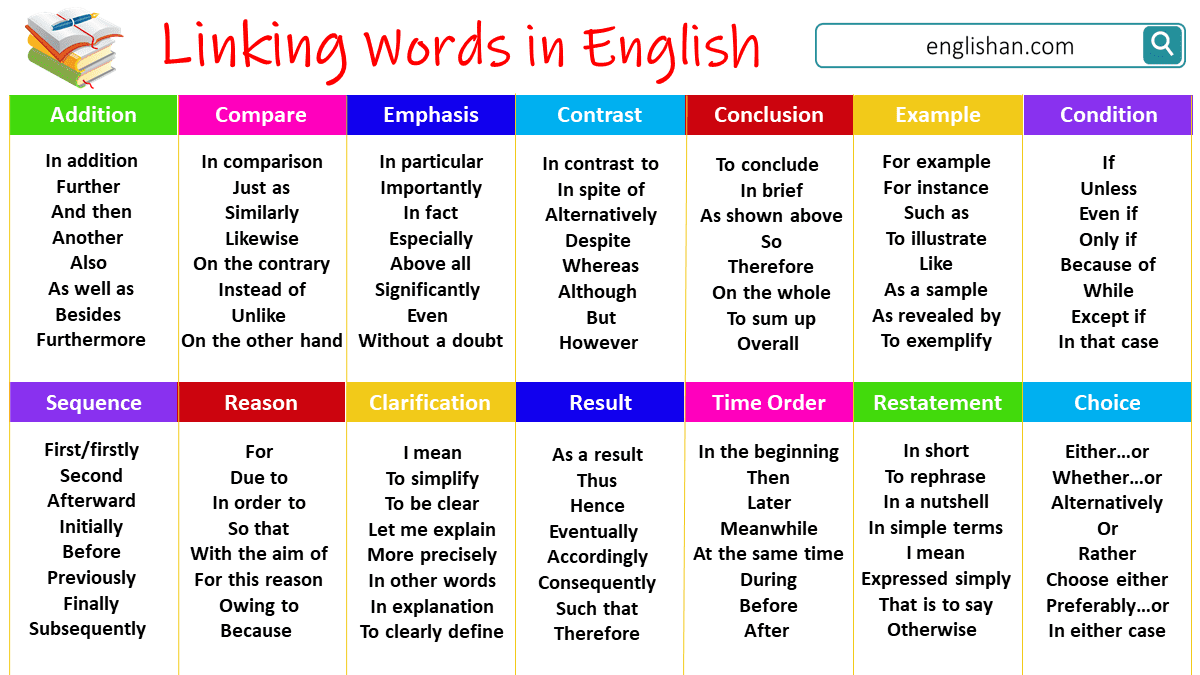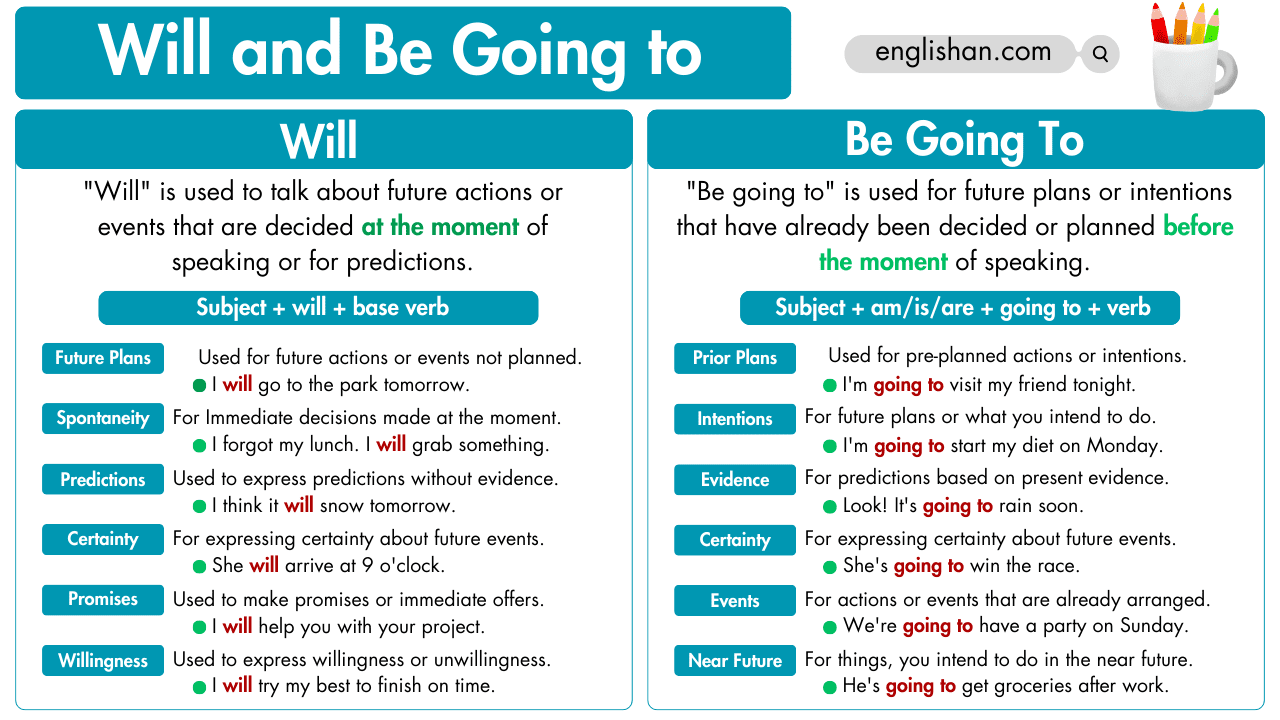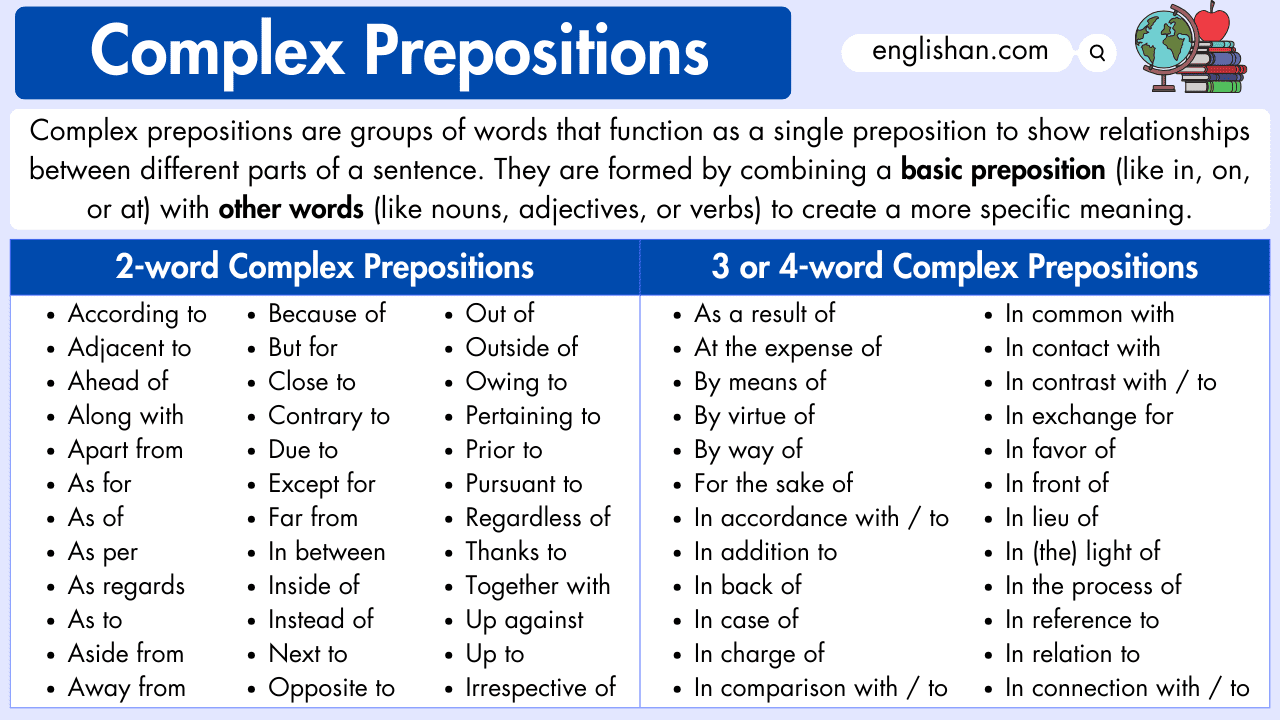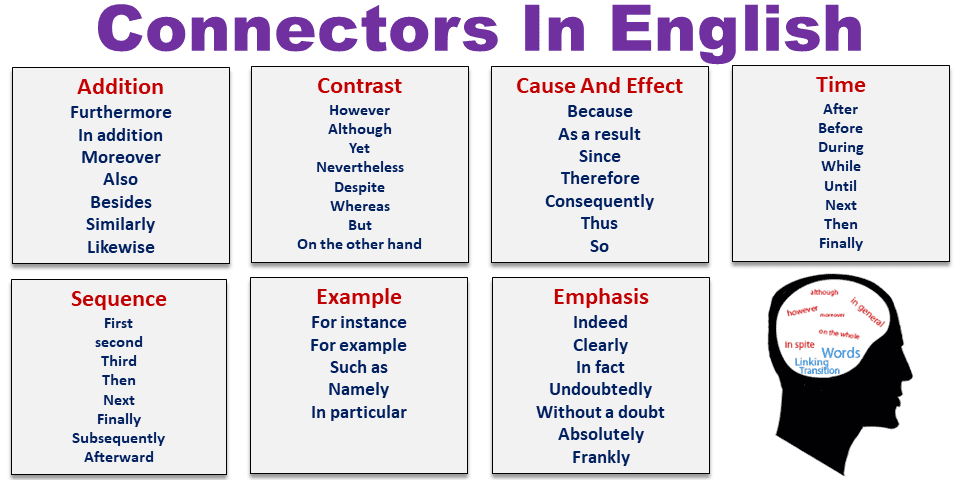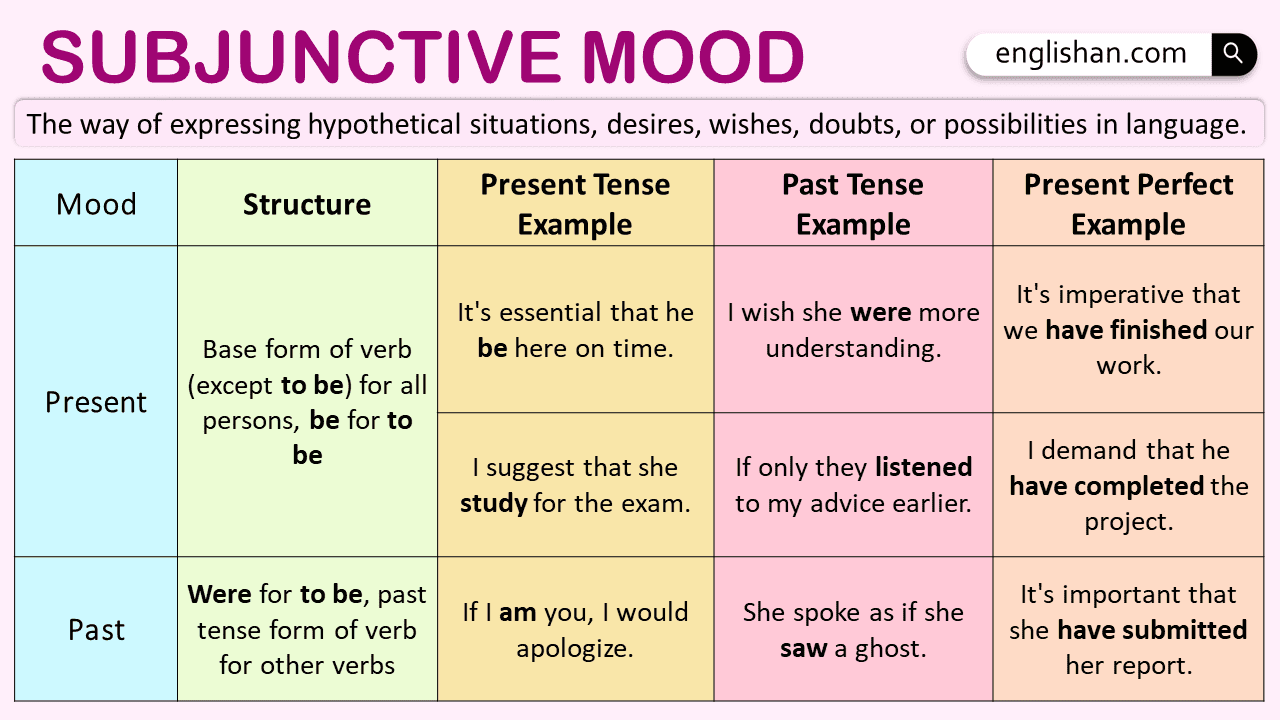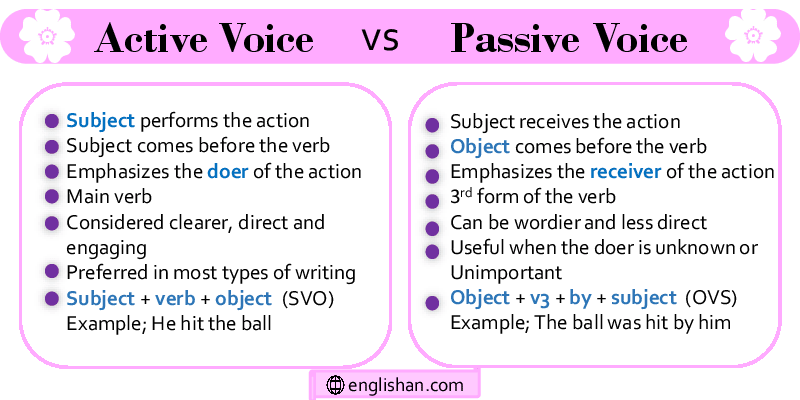Contents
In English, Question Words are very important for asking about things. These words include who, what, when, where, why, and how. They help us ask different kinds of questions. Knowing Question Words helps us find out more in talks and when we read. This is a good start for anyone who wants to learn how to ask questions better.
We ask questions to find out information. A question always has a question mark at the end.
There are different types of questions in the English language. Let’s study three main kinds.
WH Question Words
Inverted Questions:
When a sentence has a main verb, we place the helping verb ‘do / does’ before the sentence to turn it into an inverted question. We use ‘does’ with singular nouns and pronouns he, she and it. We use ‘do’ with plural nouns and pronouns I. we, you and they. In the past tense we use ‘did’ with all nouns and pronouns. In all three cases we use the base form of the verb in such questions.
Example:
| Sentences with main verbs | Question |
| He runs ten miles every day. | Does he run ten miles every day? |
| John and Thomas play foot Ball | Do John and Thomas play football? |
| We bought a new car last week. | Did we buy a new car last week? |
When sentences have helping verbs like is, am, are, was, were, have, has, can, could, may, will, would, etc. then we use the same to begin the inverted questions. if a helping verb is followed by a present participle ( verb+ing ), then it remains the same in the question. Similarly, if a helping verb is followed by a past participle, then it remains the same in the question as well.
| Statement | Question |
| I am looking tall. | Am I looking tall? |
| Mark is Tom’s neighbor. | Is Mark Tom’s neighbor? |
| Those are my clothes. | Are those my clothes? |
| The baby was chewing on a toy. | Was the baby chewing on a toy? |
| The guests were tired. | Were the guests tired? |
| They have arrived from the airport. | Have they arrived from the airport? |
| The cat has eaten its food. | Has the cat eaten its food? |
| Bob can drive a truck. | Can Bob drive a truck? |
| We will go for a picnic next week. | Will we go for a picnic next week? |
The answers to inverted questions are usually in a short ‘Yes’ or ‘no’. This is way are often also referred to as‘yes/no question’.
‘Wh’ Questions
Such questions begin with the letter ‘w,h’ or both. We can add the ‘Wh’ question word at the beginning of inverted questions as well.
| ‘WT’
Question | Purpose | Example |
| Who | We use this to ask about a person’s identity. | Who is knocking at the door? |
| What | We use this to ask information about things. | What is the capital of Turkey? |
| When | We use this to ask about time. | When do you go to the office? |
| Where | We use this to ask about places. | Where does George live? |
| Why | We use this to ask about reasons. | Why has the dog scratched the sofa? |
| Which | We use this to ask about choice. | Which dress do you like better? |
| How | We use this to find out information in general or about processes or feelings. | How was the weather in London?
How is your mother? How do you make chicken roast? |
| How + Adjective | We use this to ask about the quality of a person or thing. | How tall is the building?
How deep is the pool? |
| How much / How many | We use these to ask about quantities.
We use ‘How much’ with uncountable nouns and ’How many’ with plural nouns. | How much rice is left in the pot?
How many people came to the party? |
Some more examples:
- Do you go to the library regularly?
- How does this machine work?
- Is there any jam Left in the bottle?
- Are we going to Thailand for the holidays?
- Have the children finished their homework?
- Could you call me after an hour?
- Would you please help me with the decoration?
- Who is that tall man standing next to Jacob?
- Why is the mall so crowded today?
- How much oil should I pour in the pan?
- How cold is winter in Siberia?
- Has the plumber finished his work?
- Did you clean your room?
- Does David play baseball?
- Which toy is yours?
- Was the gate open when you walked in?
- How many flowers arc there in the vase?
- Were there any clowns at the party?
- Where have you hidden my watch?
- When will the train leave?
Tag Questions
A tag question is a statement that has a tag at the end. It’s actually the tag that makes the statement a question. Therefore, the statement + the tag are together called a tag question. The tags at the end of the statements are usually used in contracted forms. Like inverted questions, the answers to tag questions are also in a short ‘yes’ or‘no’. We ask tag questions for reassurance or further confirmation about someone or something.
Rules of making Tag Questions
- If the statement is positive, then the tag is negative.
- If the statement is negative, then the tag is positive.
- If the statement has a helping verb, then we use the same in the tag.
- If the statement has a main verb, then we use the words do, does, and did in the tag (depending on the tense of the statement and the use of pronoun — as explained in 1a).
- Whichever pronoun is used in the statement is repeated in the tag.
Example:
- Roger is an engineer, isn’t he?
- Donna has seen this film before, hasn’t she?
- You were sick last week, weren’t you?
- His Dad works at the museum, doesn’t he?
- They will visit us tomorrow, won’t they?
- George was digging a hole, wasn’t he?
- Cathy and William live on Pine Street, don’t they?
- We have eaten at this restaurant, haven’t we?
- You are studying geography, aren’t you?
- Betty can play the guitar, can’t she?
- Wendy was not working on a book, was she?
- They have not traveled abroad, have they?
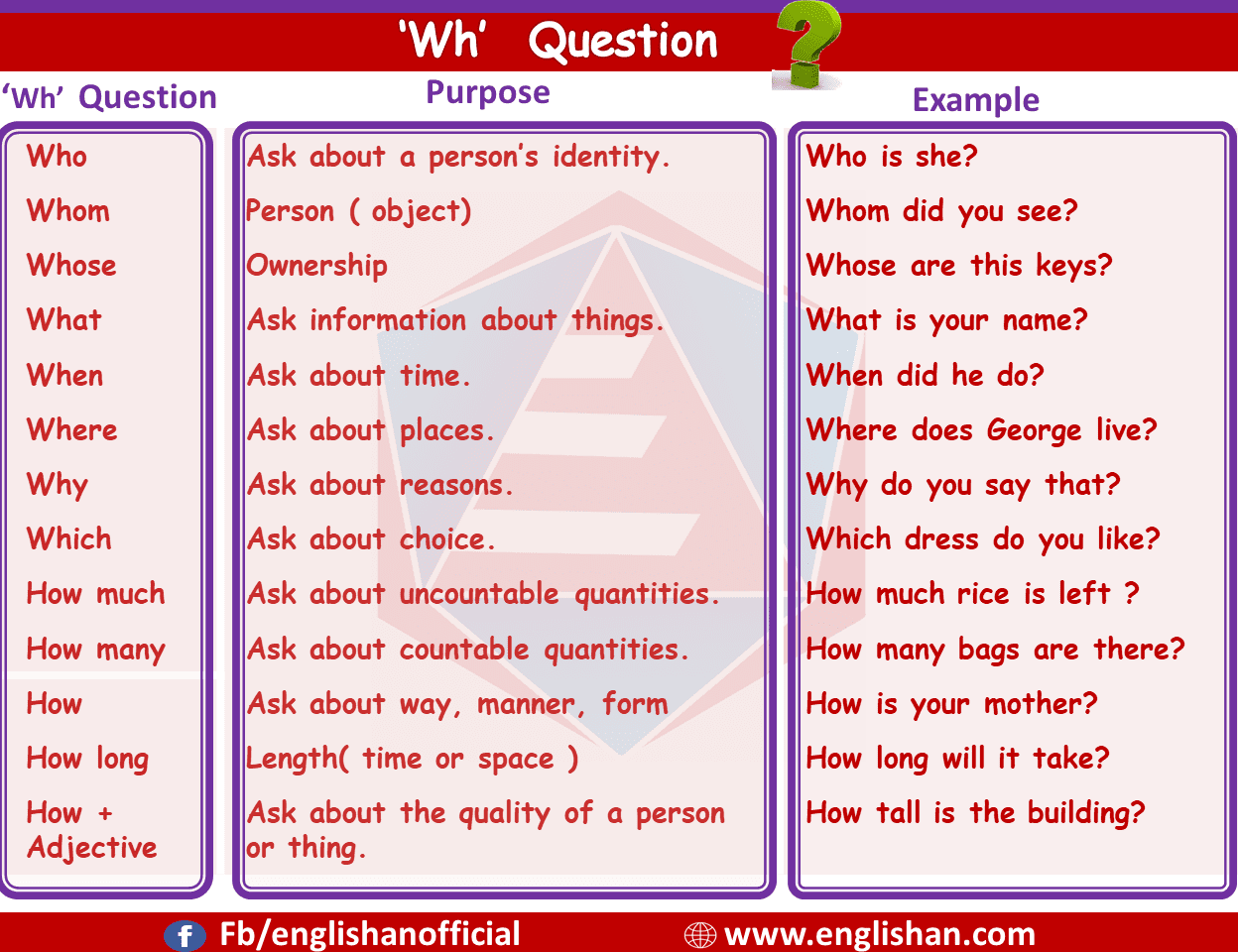
FAQs
Question words help us ask questions and get information. Here’s an easy guide:
Who – To ask about a person.
Example: Who is your friend?
What – To ask about things.
Example: What is this?
When – To ask about time.
Example: When is the party?
Where – To ask about a place.
Example: Where are you going?
Why – To ask about a reason.
Example: Why are you sad?
Which – To ask about choices.
Example: Which color do you like?
How – To ask about ways or conditions.
Example: How do you make this?
Whose – To ask about ownership.
Example: Whose book is this?
These words make it easy to ask for the exact information you need!
Here are some Wh-question words with answers:
Who – Asks about a person.
Question: Who is your teacher?
Answer: My teacher is Mrs. Smith.
What – Asks about things or information.
Question: What is your favorite fruit?
Answer: My favorite fruit is mango.
When – Asks about time.
Question: When is your birthday?
Answer: My birthday is on June 10th.
Where – Asks about a place.
Question: Where do you live?
Answer: I live in New York.
Why – Asks about a reason.
Question: Why are you late?
Answer: I missed the bus.
Which – Asks about a choice.
Question: Which color do you like?
Answer: I like blue.
How – Asks about the way something is done.
Question: How do you bake a cake?
Answer: I mix the ingredients and bake it in the oven.
Whose – Asks about ownership.
Question: Whose bag is this?
Answer: This is my sister’s bag.
These show how Wh-questions are used with simple answers!
You May Also Like
